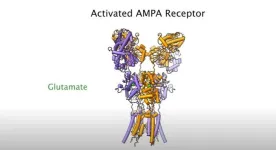(Press-News.org) By Alistair Jones
SMU Office of Research – Global condemnation of Russia over its invasion of Ukraine has prompted the imposition of trade sanctions. Such measures are a form of economic coercion, commonly used for reasons of foreign policy.
Trade sanctions can be put in place in an attempt to alter objectionable behaviour – in Russia's case, waging a war – or to punish an offending state through the disruption of economic exchange.
"Sanctions can be in many forms and raising tariffs is one of them," says Yuan Mei, an Assistant Professor of Economics at Singapore Management University (SMU). Professor Mei is the co-author of a new paper, '(Trade) War and Peace: How to Impose International Trade Sanctions', that was published in the Journal of Monetary Economics.
The researchers have built a quantitative model of international trade with input-output connections, and the aim of the paper is to "compute the most cost-efficient way to impose trade sanctions against Russia in the context of the Russia-Ukraine war", Professor Mei says.
Willingness to pay
Trade sanctions are meant to hurt the sanctioned country’s economy, but if they severely restrict trade, they can also hurt the sanctioning countries.
"Raising tariffs on Russian goods can hurt the Russian economy. In the meanwhile, this action could also hurt the sanctioning country by making imports more costly," Professor Mei says.
Under import restrictions, consumers in the imposing country may have limited choices of goods, which affects their welfare. And if export restrictions are imposed, or if sanctions prohibit companies in the imposing country from trading with the target country, the imposing country may lose markets and investment opportunities to competing countries.
To make sense of this apparent juggling act, the researchers offer the concept of ‘Willingness to pay’ – the amount of economic burden an imposing country is prepared to incur to exact damage on the target country.
"We find that for countries with a low willingness to pay for sanctions, the optimal strategy is to impose a moderate and similar tariff across all products," Professor Mei says.
For example, if a sanctioning country is willing to sacrifice US$0.10 per US$1 loss incurred by the Russian economy, the cost-efficient trade sanction would be a uniform tariff of 20 percent.
The effect would be that "Russia’s export to the sanctioning countries will decrease, which eventually leads to less national income. In this scenario, the eventual welfare (real GDP) loss of Russia is 1.2 percent based on our calculation," he says.
Key exports
"For countries with a high willingness to pay for sanctions, sanctioning countries should target what Russia exports the most – mining and energy products," Professor Mei says.
In fact, the U.S., the European Union (EU), the G7 and sanctioning allies such as Australia have recently prohibited the import of seaborne crude oil and refined petroleum products from Russia. Is this a step in the right direction?
"Yes. Our simulation results show that countries with high willingness to pay should impose an embargo on Russia’s oil and energy exports, and these countries do appear to have a high willingness to pay." Professor Mei says.
But Russia has found alternative markets, notably in India, which is happy to buy discounted crude oil, reportedly in huge quantities. And China, Russia's largest trading partner, has supported what Russia calls its "special military operation" in Ukraine. Can trade sanctions be effective without unified global support?
"That depends on the definition of effective sanction," Professor Mei says. "In the paper, we consider an alternative scenario in which the non-sanctioning countries join the U.S., EU and their allies to sanction Russia. In this case, the maximum welfare loss on Russia increases from two percent to six percent, which we consider a significant increase."
But the economic effect of the existing sanctions regime on non-sanctioning countries does not seem like an incentive to change position.
"The rest of the world (ROW) boosts its exports in reaction to sanctions placed on Russia. As sanctioning countries raise tariffs against Russia, sanctioning countries substitute imports from Russia with those from the ROW. This pattern, referred to as the trade diversion effect, leads to an increase in ROW exports to the sanctioning countries," Professor Mei says.
Carrying the burden
The researchers note that Russia exports much more to the EU – the world's largest trading bloc – than to the U.S. or other sanctioning allies (OSA). Accordingly, tariffs imposed by the U.S. or OSA can, at most, reduce Russian real income by only 0.07 percent or 0.22 percent, respectively. By contrast, the EU alone can reduce real income in Russia by as much as 0.8 percent. Therefore, the burden of trade sanctions against Russia would seem to fall on the EU.
"We are not saying that the EU has to carry the burden. To be more accurate, our message is the EU is the group of countries that can hurt the Russian economy the most – not the U.S. or other sanctioning allies," Professor Mei says.
Sanctions, of course, can go both ways. Russia could retaliate by levying tariffs on the U.S. and Europe, but Professor Mei’s research suggests it would hurt Russia even more.
“If Russia also chooses tariffs to punish the sanctioning countries, the economic consequence of tariff sanctions on Russia would more than double,” he explains. “The EU is an important importing origin for Russia but Russia is not an important exporting destination for the EU. Therefore, Russia imposing retaliatory tariffs on EU would result in a large decline in its own welfare, but it does not decrease EU welfare much.”
END
Imposing cost-efficient trade sanctions
2024-06-10
ELSE PRESS RELEASES FROM THIS DATE:
Statins for heart disease prevention could be recommended for far fewer Americans if new risk equation is adopted
2024-06-10
PITTSBURGH – If national guidelines are revised to incorporate a new risk equation, about 40% fewer people could meet criteria for cholesterol-lowering statins to prevent heart disease, according to a study by researchers at the University of Pittsburgh, Beth Israel Deaconess Medical Center and University of Michigan. Published today in JAMA Internal Medicine, the study examines the potential impact of widespread adoption of the PREVENT equations, which were released by the American Heart Association ...
Multicenter clinical study supports safety of deep general anesthesia
2024-06-10
General anesthesia makes it possible for millions of patients each year to undergo lifesaving surgeries while unconscious and free of pain. But the 176-year-old medical staple uses powerful drugs that have stoked fears of adverse effects on the brain — particularly if used in high doses.
New findings published June 10 in the Journal of the American Medical Association (JAMA), however, support an earlier study that indicates that anesthesia is no more hazardous for the brain at higher doses than at lower doses, ...
Cancer incidence trends in successive social generations in the US
2024-06-10
About The Study: In this model-based cohort analysis of incident invasive cancer in the general population, decreases in lung and cervical cancers in Generation X may be offset by gains at other sites. Generation X may be experiencing larger per-capita increases in the incidence of leading cancers than any prior generation born in 1908 through 1964. On current trajectories, cancer incidence could remain high for decades.
Corresponding Author: To contact the corresponding author, Philip S. Rosenberg, Ph.D., email rosenbep@mail.nih.gov.
To access the embargoed study: Visit ...
Global prevalence of overweight and obesity in children and adolescents
2024-06-10
About The Study: This study’s findings indicated 1 of 5 children or adolescents experienced excess weight and that rates of excess weight varied by regional income and Human Development Index. Excess weight among children and adolescents was associated with a mix of inherent, behavioral, environmental, and sociocultural influences that need the attention and committed intervention of primary care professionals, clinicians, health authorities, and the general public.
Corresponding Author: To ...
Severe pediatric neurological manifestations with SARS-CoV-2 or MIS-C hospitalization and new morbidity
2024-06-10
About The Study: The results of this study suggest that children and adolescents with acute SARS-CoV-2 or multisystem inflammatory syndrome in children (MIS-C) and severe neurological manifestations may be at high risk for long-term impairment and may benefit from screening and early intervention to assist recovery.
Corresponding Author: To contact the corresponding author, Ericka L. Fink, M.D., M.S., email finkel@ccm.upmc.edu.
To access the embargoed study: Visit our For The Media website at this link https://media.jamanetwork.com/
(doi:10.1001/jamanetworkopen.2024.14122)
Editor’s ...
Elephants have names for each other like people do, new study shows
2024-06-10
Colorado State University scientists have called elephants by their names, and the elephants called back.
Wild African elephants address each other with name-like calls, a rare ability among nonhuman animals, according to a new study published in Nature Ecology and Evolution.
Researchers from CSU, Save the Elephants and ElephantVoices used machine learning to confirm that elephant calls contained a name-like component identifying the intended recipient, a behavior they suspected based on observation. When the researchers played back recorded calls, elephants responded affirmatively ...
In a significant first, researchers detect water frost on solar system’s tallest volcanoes
2024-06-10
PROVIDENCE, R.I. [Brown University] — An international team of planetary scientists has detected patches of water frost sitting atop the Tharsis volcanoes on Mars, which are not only the tallest volcanic mountains on the Red Planet but in the entire solar system.
The discovery marks the first time frost has been spotted near the planet’s equator, challenging existing perceptions of the planet’s climate dynamics, according to the team’s new study in Nature Geoscience.
“We thought it was improbable for frost to form around Mars’ equator, as the mix ...
Super-chilled brain cell molecules reveal how epilepsy drug works
2024-06-10
FOR IMMEDIATE RELEASE
By super cooling a molecule on the surface of brain cells down to about minus 180 degrees Celsius — nearly twice as cold as the coldest places in Antarctica — scientists at Johns Hopkins Medicine say they have determined how a widely-used epilepsy drug works to dampen the excitability of brain cells and help to control, although not cure, seizures.
The research, published June 4 in Nature Structural & Molecular Biology, identifies critical connections between activity of the epilepsy drug ...
Benefits of failure are overrated
2024-06-10
The platitude that failure leads to success may be both inaccurate and damaging to society, according to research published by the American Psychological Association.
Researchers conducted 11 experiments with more than 1,800 participants across many domains and compared national statistics to the participants’ responses. In one experiment, participants vastly overestimated the percentage of prospective nurses, lawyers and teachers who pass licensing exams after previously failing them.
“People expect success to follow failure much more often than it actually does,” said lead researcher Lauren Eskreis-Winkler, PhD, an assistant ...
NUTRITION 2024 showcases groundbreaking research on what we eat and why it matters
2024-06-10
Don’t miss your chance to be among the first to hear breaking news in food and nutrition science at NUTRITION 2024. The annual flagship meeting of the American Society for Nutrition will be held June 29–July 2 at McCormick Place in Chicago.
Reporters and bloggers are invited to explore the meeting schedule and register for a complimentary press pass to attend.
The meeting will feature stimulating discussions, exciting research announcements and updates from groups shaping the nutrition and health policies that affect us all. Highlights include:
Diet and exercise performance – As the ...







